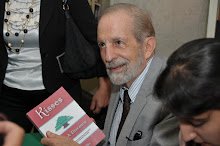 When Abraham Lincoln delivered the Gettysburg Address, all 271 words, there was but polite scattered applause. No photo of him standing on the stage exists because Lincoln had finished speaking by the time the one photographer who thought it might be worthy of recording got set up. What has gone down as one of America's greatest speeches is also a great example of choosing one's words carefully for brevity, content, and impact.
When Abraham Lincoln delivered the Gettysburg Address, all 271 words, there was but polite scattered applause. No photo of him standing on the stage exists because Lincoln had finished speaking by the time the one photographer who thought it might be worthy of recording got set up. What has gone down as one of America's greatest speeches is also a great example of choosing one's words carefully for brevity, content, and impact.Many authors, myself included, get so enamored with their prose that they don't know when to turn it off. It's the antithesis of writer's block, called logorrhea (excessive verbosity). There are also some writing guidelines involved that most novelists have heard about, e.g. how many pages it must have, as if volume is an important metric. I once worked for a consulting group whose total work output was written reports. I remember one occasion when my boss took a report I had written and hefted it in the palm of his hand. "Doesn't pass the weight test," he said. An economy of words didn't translate into satisfaction for the customer, no matter how succinct those words might have been.
If an author has penned a 50,000 word novel, there's a good chance that a publisher (if he/she has the good fortune to get it in front of one) will say, "It needs to be 80,000." That's a magic number for publishers, as it makes a book of the proper "heft." It's a good thing Abraham Lincoln didn't know about such rules. The speaker who preceded him at Gettysburg that day, Edward Everett, used over 13,000 words in his speech and took two hours to deliver it. The irony is that no one reads his, while many schoolchildren have memorized Lincoln's.
I'll admit it is hard to go back over something I've written and chop out what I perceive as "eloquent phrasing." I'm sure others have this problem as well. To help guide my writing, I've tacked up a note next to my computer that has three questions:
• Does this sentence advance the storyline?
• Do these words expand the character(s)?
• Does this sentence help draw events together?
If the writing I'm looking at doesn't do any of the above, it's a candidate for the delete button.




1 comment:
Never miss a chance to keep your mouth shut. Also, it is better to keep your mouth shut and be thought a fool rather than to open it and prove it. Abenaki Advice.
Post a Comment